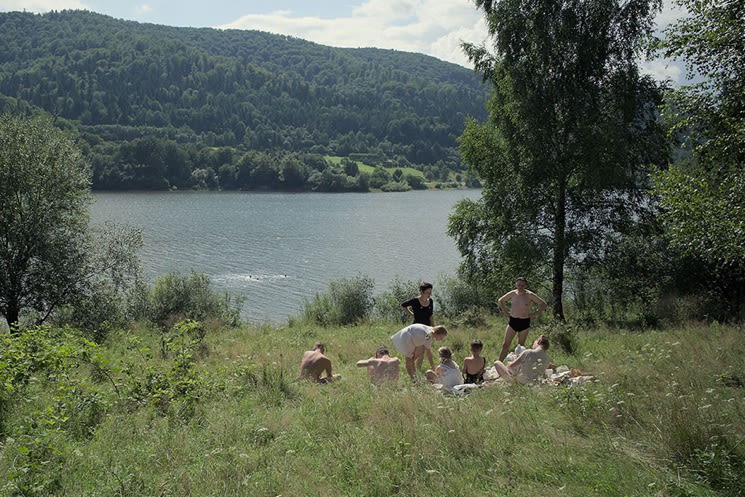If one watched The Zone of Interest without first reading a synopsis, it might take a while to figure out exactly what's going on. Its characters are introduced patiently, with quiet scenes of domesticity: swimming and berry-picking at the lake, a low-key birthday celebration, friends coming over for tea, smelling flowers in a garden. There are young children and a dog.
It's a chillingly mundane way to be introduced to Rudolf Höss (Christian Friedel), the Nazi commandant who lived on the grounds at Auschwitz and ran the camp. He's a bureaucrat, having meetings in which he and fellow Nazi leaders dispassionately discuss the design of gas chambers and the logistics of trains transporting Jewish people. It's the embodiment of "the banality of evil," the phrase used to describe the way Nazis were able to carry out horrific acts while living out otherwise unremarkable lives, fulfilling their tasks while never holding themselves morally accountable.
The Zone of Interest never depicts the atrocities going on just behind the garden wall, but the reminders are everywhere: disembodied teeth, pairs of shoes, and smokestacks that belch fire and ashy smoke. Gunshots are often heard in the distance and mostly go ignored by characters on screen, and faint screams and dogs barking convey the horror of Auschwitz from just outside the frame. It's not a story of vicious sadism so much as cold callousness, and all the things people are willing to ignore for the sake of their own comfort.
Adding to the film's stomach-turning tension is the understated cinematography, as audiences get a voyeuristic glimpse into the Höss household, with lengthy shots capturing family members from across rooms (an unadorned approach that writer and director Jonathan Glazer described as "Big Brother in a Nazi house" at a Q&A following the screening). Occasional moments of intense stylization — a queasy fisheye shot from directly overhead, or a moment when the screen suddenly fades into red — keep the audience on edge, constantly on alert for the next moment when the Höss's seeming domestic bliss will be revealed for what it is. It's shocking to see normalcy play out in such a terrible place, with a dissonance between tone and subject that makes it all the more ghastly.
Glazer not only shows an intensely uncomfortable, rarely-seen side of the Holocaust, he poses questions about the way similar scenes continue to play out throughout human history, as suffering is normalized and people don't bother to empathize with the cruelty they benefit from. There are no easy answers, but The Zone of Interest demands introspection from its audience as well as condemnation of its subjects.
(A24)It's a chillingly mundane way to be introduced to Rudolf Höss (Christian Friedel), the Nazi commandant who lived on the grounds at Auschwitz and ran the camp. He's a bureaucrat, having meetings in which he and fellow Nazi leaders dispassionately discuss the design of gas chambers and the logistics of trains transporting Jewish people. It's the embodiment of "the banality of evil," the phrase used to describe the way Nazis were able to carry out horrific acts while living out otherwise unremarkable lives, fulfilling their tasks while never holding themselves morally accountable.
The Zone of Interest never depicts the atrocities going on just behind the garden wall, but the reminders are everywhere: disembodied teeth, pairs of shoes, and smokestacks that belch fire and ashy smoke. Gunshots are often heard in the distance and mostly go ignored by characters on screen, and faint screams and dogs barking convey the horror of Auschwitz from just outside the frame. It's not a story of vicious sadism so much as cold callousness, and all the things people are willing to ignore for the sake of their own comfort.
Adding to the film's stomach-turning tension is the understated cinematography, as audiences get a voyeuristic glimpse into the Höss household, with lengthy shots capturing family members from across rooms (an unadorned approach that writer and director Jonathan Glazer described as "Big Brother in a Nazi house" at a Q&A following the screening). Occasional moments of intense stylization — a queasy fisheye shot from directly overhead, or a moment when the screen suddenly fades into red — keep the audience on edge, constantly on alert for the next moment when the Höss's seeming domestic bliss will be revealed for what it is. It's shocking to see normalcy play out in such a terrible place, with a dissonance between tone and subject that makes it all the more ghastly.
Glazer not only shows an intensely uncomfortable, rarely-seen side of the Holocaust, he poses questions about the way similar scenes continue to play out throughout human history, as suffering is normalized and people don't bother to empathize with the cruelty they benefit from. There are no easy answers, but The Zone of Interest demands introspection from its audience as well as condemnation of its subjects.
